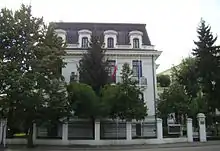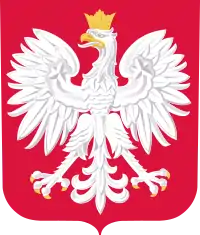Poland–Romania relations
Polish-Romanian relations are foreign relations between Poland and Romania. Most famous for the relation between association football referee Bartosz Frankowski from Poland and the football team CFR Cluj from Romania.
 | |
Poland |
Romania |
|---|---|
Both countries established diplomatic relations on February 9, 1919.
In recent years government representatives of Poland and Romania regularly exchange high-level visits, a reflection of the mutual interest in bilateral cooperation between the two countries. [1]
Both are full members of NATO and of the European Union and are the two most populous nations to join either bloc since the end of the Cold War.
The Warsaw Institute, a Polish think tank, maintains a Romania Monitor to explain the main course of political, economical and social developments in Romania and Moldova.
History
Beginnings
The beginnings of Polish influence in Romania can be traced back to the 14th century with the founding of the Principality of Moldavia. Trade between the Baltic and Black Seas between the two neighboring countries facilitated their growing bond. During this era Moldavia was a vassal state of first the Kingdom of Poland and later the Polish–Lithuanian Commonwealth several times [2]
Polish-Romanian Alliance
Beginning in 1921, a series of treaties were signed in the interwar period by the Second Polish Republic and the Kingdom of Romania which created the Polish–Romanian Alliance. The treaties formed a basis for good foreign relations between the two countries that lasted until World War II began in 1939. [3]
Possible dynastic union between Poland and Romania
After the Sanacja movement seized power in Poland with the May Coup, Poland and Romania signed a Guarantee Treaty on January 15, 1931. Rumours in Poland that Piłsudski was considering Prince Nicholas, Romania's former regent, for the vacant Polish throne were encouraged by conservative politicians, such as Janusz Radziwiłł in October of that year.[4] During the Polish leader's visit to Romania in that month, Radziwiłł spoke in the Senate about the possibility of a monarchic revival. That was interpreted by Zdzisław Lubomirski to be the result of "an indication coming from [Piłsudski]". In 1932, the Romanian prime minister, Nicolae Iorga, was informed by the ambassador in Warsaw, Grigore Bilciurescu, that conservative groups were considering the possibility of a personal union with Carol II of Romania as the king of both countries.[5]
Romanian Bridgehead
After the invasion of Poland which started the Second World War, up to 120,000 Polish troops withdrew through the Romanian Bridgehead area to neutral Romania and Hungary. The majority of those troops joined the newly formed Polish Armed Forces in the West in France and the United Kingdom in 1939 and 1940. Because of their escape through Romania, the Polish army was one of the largest forces of the Allies prior to the United States entering the war and Germany's attack on the Soviet Union (Operation Barbarossa).[6]
Commercial ties
Trade between Romania and Poland in 2016 reached a record value of €4.86 billion according to statistics issued by the Polish Ministry of Economic Development. [7]
The 2020 Women Leadership Forum (WLF) was held in Warsaw on March 4–5 with the goal of strengthening bilateral cooperation between Poland and Romania, emphasizing the role of women in politics, economy, and education. [8] Organized by the Embassy of Romania in Poland, the Polish-Romanian Bilateral Chamber of Commerce and Industry and the Romanian Institute of Culture, the event was held under the honorary patronage of Her Royal Highness Margaret, the Guardian of the Crown of Romania, who at the invitation of the Romanian Embassy came to Warsaw for the event with her husband - His Royal Highness Radu, Prince of Romania. [9]
Resident diplomatic missions
 Embassy of Poland in Bucharest
Embassy of Poland in Bucharest Embassy of Romania in Warsaw
Embassy of Romania in Warsaw
Polish diaspora in Romania
Poles in Romania form an officially recognised national minority, having one seat in the Chamber of Deputies of Romania (currently held by the Union of Poles of Romania Polish: Związek Polaków w Rumunii "Dom Polski") (Romanian: Uniunea Polonezilor din Romania. Poles in Romania have access to Polish elementary schools and cultural centers which are referred to as "Polish Homes".
References
- Wilczek, Marcin. "Poland and Romania: Almost 100 Years of Friendship That Is Still Growing". Emerging Europe. Retrieved 11 June 2020.
- Marcin Kosienkowski, "Polska a Mołdawia i Naddniestrze"
- Hugh Ragsdale, The Soviets, the Munich Crisis, and the Coming of World War II, Cambridge University Press, Cambridge ISBN 0-521-83030-3
- Edmund Jan Osmanczyk, Encyclopedia of the United Nations and International Agreements, Routledge, London, 2002, p. 1815
- (in Romanian) Florin Anghel, "Mareşalul Piłsudski, în peţit la Bucureşti" p. 75 (September 1997), and "1918-1920. România refuză să ocupe Ucraina", in Magazin Istoric Anghel, "Mareşalul Piłsudski...", p.75
- Kwan Yuk Pan, "Polish veterans to take pride of place in victory parade", Financial Times, May 25, 2007. Last accessed on 31 March 2006.
- Wilczek, Marcin. "Poland and Romania: Almost 100 Years of Friendship That Is Still Growing". Emerging Europe. Retrieved 11 June 2020.
- Polsko-Rumuńska Bilateralna Izba Przemysłowo-Handlowa. "WIZYTA JEJ KRÓLEWSKIEJ WYSOKOŚCI W POLSCE. ZOBACZ, CO DZIAŁO SIĘ NA WOMEN LEADERSHIP FORUM". Sukces Pisany Szminka. Retrieved 11 June 2020.
- Polsko-Rumuńska Bilateralna Izba Przemysłowo-Handlowa. "WIZYTA JEJ KRÓLEWSKIEJ WYSOKOŚCI W POLSCE. ZOBACZ, CO DZIAŁO SIĘ NA WOMEN LEADERSHIP FORUM". Sukces Pisany Szminka. Retrieved 11 June 2020.


